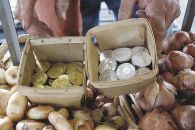A Michigan Nonprofit Serves Up a Double Deal for Healthier Eating
June 29, 2011
Source: Chronicle of Philanthropy
Author: Nicole Wallace
(Note: The full article is available here courtesy of The Chronicle of Philanthropy.)
Incentives are often referred to as “carrots.” But the Fair Food Network is also counting on broccoli, peaches, tomatoes, blueberries, and green beans.
With its Double Up Food Bucks program, the Ann Arbor, Mich., nonprofit organization seeks to improve poor communities’ access to healthy, nutritious food while at the same time aiding Michigan’s farmers and rural economy.
Through the program, participants can double the value of their food stamps at 48 farmers’ markets across the state and in neighboring Toledo, Ohio. For every $2 in food stamps participants spend at the markets, they receive $2 in tokens good for Michigan-grown fruits and vegetables, up to $20 per visit.
In 2010, the federal government spent more than $68-billion on the food-assistance program, a sizable chunk of its total outlay for food and agriculture.
“There is a way to use that flow of funds much more effectively than we are right now, as a nation, to help stem the tide of obesity and diet-related illness and at the same time support small and mid-size local farming,” says Oran B. Hesterman, chief executive of the Fair Food Network. “We can do both at the same time.”
The idea has won significant support from grant makers. Last year Open Society Foundations awarded a $3-million matching grant to the Fair Food Network to take the program statewide; the grant has been matched by money from 27 grant makers and nonprofit institutions. The largest of those matching awards was $1.2-million from the W.K. Kellogg Foundation, in Battle Creek, Mich.
Scarcity of Produce
Fresh food often isn’t readily available to low-income shoppers. Two years ago, the Double Up Food Bucks program got its start in Detroit—which despite being the eleventh largest city in the country, doesn’t have a major grocery store.

“There are some independently owned small-scale grocery stores where residents can get fruits and vegetables, but they are few and far between,” says Mr. Hesterman.
In a state where one in five residents receives food-stamp benefits, the prospect of increased buying power has proved to be a draw. Last year the program ran in 15 farmers’ markets from August through October. During that time, participants spent $111,585 in food stamps at the markets and redeemed $91,866 in Food Bucks tokens to purchase locally grown fruits and vegetables.
“If you create an incentive for people to bring their food-stamp money to a farmers’ market, they will get there to buy healthier food,” says Mr. Hesterman.
When people first find out about Double Up Food Bucks, they often have a “necessary skepticism,” says Rachel Chadderdon, the program’s director. They want to know if the program’s really free, or if there’s some sort of catch. But once people realize the program is legitimate, she says, they become enthusiastic participants.
The extra money allows people to branch out and try new vegetables rather than just spending their limited food dollars on the ones they know their families will eat, says Ms. Chadderdon: “They’re able to ask the vendor at the market, ‘What is this kohlrabi? What do I do with it?’ ”
The program is a boon to farmers, while helping people buy items they otherwise might not have felt they could afford, she says.
Last year on opening day at Detroit Eastern Market, a berry farmer sold out his produce for the first time ever, in large part because of Double Up Food Bucks tokens, she says.
“He had both pockets just full of them,” says Ms. Chadderdon. Farmers turn in the tokens they receive and are paid either that day or later by check, depending on the market.
Influencing Policy
While the Fair Food Network is excited about its work in farmers’ markets, the organization realizes that people usually buy most of their food in stores. To that end, the nonprofit will test a similar version of the Double Up Food Bucks program later this year in up to six independently owned grocery stores in Detroit. Outside of the growing season, participants will be able to use tokens for fresh produce regardless of where it came from.
The Fair Food Network plans to use the findings from its work in Michigan to persuade lawmakers in Washington to incorporate similar incentives into federal food-assistance programs.
In addition to collecting weekly data from participating farmers’ markets, the Fair Food Network has hired a consulting company to conduct an in-depth evaluation of the program over three years. “If it works well, we should not expect philanthropy to support it forever,” says Mr. Hesterman.
The Fair Food Network and its supporters acknowledge the tough budget climate and say that’s why the program’s focus on evaluation is so important.
Mimi Corcoran, director of the Special Fund for Poverty Alleviation at the Open Society Foundations, says that in a time of crisis it makes sense to reassess old ways of doing things.
“Often we get going along and just do it because we don’t have to weigh one policy versus another, to weigh one program versus another,” she says. “It’s good to take stock and say, Show me the body of evidence that says we should continue down the road that we’re on.”







